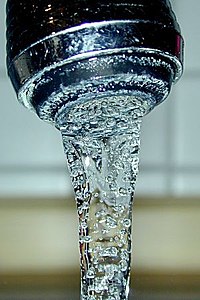Wikipedia:WikiProject Water/Assessment

Welcome to the assessment department of the Water WikiProject! This department focuses on assessing the quality of Wikipedia's articles about water supply in the world. While much of the work is done in conjunction with the WP:1.0 program, the article ratings are also used within the project itself to aid in recognizing excellent contributions and identifying topics in need of further work.
The ratings are done in a distributed fashion through parameters in the {{WikiProject Water supply and sanitation}} project banner; this causes the articles to be placed in the appropriate sub-categories of Category:Water articles by quality, which serves as the foundation for an automatically generated worklist.
Frequently asked questions
- How can I get my article rated?
- Please list it in the section for assessment requests below.
- Who can assess articles?
- Any member of the Water supply and sanitation WikiProject is free to add—or change—the rating of an article.
- What if I don't agree with a rating?
- You can list it in the section for assessment requests below, and someone will take a look at it. Alternately, you can ask any member of the project to rate the article again.
- Aren't the ratings subjective?
- Yes, they are, but it's the best system we've been able to devise; if you have a better idea, please don't hesitate to let us know!
If you have any other questions not listed here, please feel free to ask them on the discussion page for this department.
Instructions
An article's assessment is generated from the class and importance parameters in the {{WikiProject Water}} project banner on its talk page:
{{WikiProject Water supply and sanitation
|class=
|importance=
|attention=
|collaboration-candidate=
|past-collaboration=
|peer-review=
|old-peer-review=
|needs-infobox=
}}
The following values may be used for the class parameter:
- FA (adds articles to Category:FA-Class Water articles)
- A (adds articles to Category:A-Class Water articles)
- GA (adds articles to Category:GA-Class Water articles)
- B (adds articles to Category:B-Class Water articles)
- Start (adds articles to Category:Start-Class Water articles)
- Stub (adds articles to Category:Stub-Class Water articles)
- NA (for pages, such as templates or disambiguation pages, where assessment is unnecessary; adds pages to Category:NA-Class Water articles)
Articles for which a valid class is not provided are listed in Category:Unassessed Water articles. The class should be assigned according to the quality scale below.
Quality scale
Importance scale
The criteria used for rating article importance are not meant to be an absolute or canonical view of how significant the topic is. Rather, they attempt to gauge the probability of the average reader of Wikipedia needing to look up the topic (and thus the immediate need to have a suitably well-written article on it). Thus, subjects with greater popular notability may be rated higher than topics which are arguably more "important" but which are of interest primarily to students or teachers learning about Water supply and sanitation .
Note that general notability need not be from the perspective of editor demographics; generally notable topics should be rated similarly regardless of the country or region in which they hold said notability. Thus, topics which may seem obscure to a Western audience—but which are of high notability in other places—should still be highly rated.
| Status | Template | Meaning of Status |
|---|---|---|
| Top | {{Top-Class}} | This article is of the utmost importance to this project, as it forms the basis of all information. |
| High | {{High-Class}} | This article is fairly important to this project, as it covers a general area of knowledge. |
| Mid | {{Mid-Class}} | This article is relatively important to this project, as it fills in some more specific knowledge of certain areas. |
| Low | {{Low-Class}} | This article is of little importance to this project, but it covers a highly specific area of knowledge or an obscure piece of trivia. |
| None | None | This article is of unknown importance to this project. It remains to be analyzed. |
